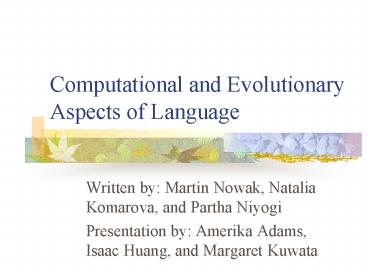Computational and Evolutionary Aspects of Language - PowerPoint PPT Presentation
1 / 11
Title:
Computational and Evolutionary Aspects of Language
Description:
Formal Language Theory. It is a mode of communication. It is a crucial part of human behavior ... The theory states that by taking a population of individuals ... – PowerPoint PPT presentation
Number of Views:11
Avg rating:3.0/5.0
Title: Computational and Evolutionary Aspects of Language
1
Computational and Evolutionary Aspects of
Language
- Written by Martin Nowak, Natalia Komarova, and
Partha Niyogi - Presentation by Amerika Adams, Isaac Huang, and
Margaret Kuwata
2
Purpose
- Attempt to formulate a synthesis of three
theories. - Addresses the importance of human language.
- Addresses the following questions
- 1. What is language?
- 2. What is grammar?
- 3. What is learning?
- 4. How does a child learn language?
- 5. How formal language theory and
learning theory can be extended to study language
as a biological phenomenon and as a product of
evolution.
3
Formal Language Theory
- It is a mode of communication
- It is a crucial part of human behavior
- It is the sequencing of small units into bigger
structures. - There are rules for word grouping.
4
What is language?
- The alphabet is a set of symbols
- Sentences are strings of symbols
- Language is a set of sentences
- Example Binary Language
5
What is grammar?
- It is a finite set of rules specifying a
language. - Expressed in terms of rewrite rules
6
Languages, Grammars, and Machines.
- Correspondence between languages, grammars, and
machines. - Regular Languages are generated by finite-state
grammars which is equal to finite-state automata.
- Finite-state automata have a start, a finite
number of intermediate states, and a finish. - A particular run from start to finish produces a
sentence.
7
Learning Theory
- Learning is the ability to generalize beyond
ones own experience to new circumstances. - Learning theory describes the mathematics of
learning with the aim of outlining conditions for
successful generalization. - Theory of Universal Grammar (UG)
8
What is special about language acquisition?
- We learn the grammar of generative systems.
- The process occurs without being instructed about
rules. - The set of all computable languages is learnable
by an algorithm that memorizes the rules.
9
Evolutionary Language Theory
- The evolution of language occurred in several
incremental steps that were guided by natural
selection. - The theory states that by taking a population of
individuals and with each individual using a
particular language, the successful ones are able
to communicate which results in a pay-off that
attributes to fitness. - Languages change overtime because the
transmission from one generation to the next is
not perfect.
10
Agreements
- 1. Language is a crucial part of human identity
and behavior. - 2. Language has evolved through Darwinian
dynamics of natural selection. - 3. That learning is the ability to generalize
beyond ones own experience. Not just modeling
others.
11
Disagreements
- 1. The set of all computable languages is
learnable by an algorithm that memorizes rules.
(?) - That children have a restricted set of innate
languages they could learn correctly.































